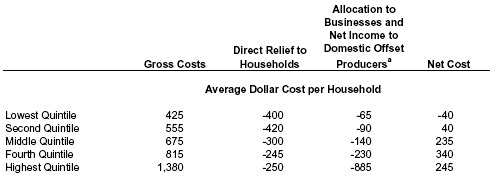After watching a tedious press conference this morning at which not a single question was asked about the Waxman-Markey bill (after Obama endorsed it!), I’m happy to see that somebody outside the dreary confines of “green blogging” is grappling with it. If it all happens to be obsessively focused on the CBO report, well, I’ll take what I can get.
Let’s take a walk through the last few days of action.
First, Ryan Avent noted the new CBO report, which says that Waxman-Markey will cost the average household about a postage stamp a day and actually benefit the lowest quintile households. Kevin Drum also made the point, complete with the CBO’s chart:

Brad Plumer made the additional point — a favorite of mine — that economists have tended to overestimate the costs of environmental regulation.
Enter Jim Manzi, the voice of Sensible Conservative Opinion on Green Issues. A while back he wrote a post making his usual point about climate change legislation — the costs aren’t worth the benefits. He said the recent CBO and EPA reports don’t change that assessment. Avent replied, noting that Manzi is wrong in all the familiar ways that have been pointed out before. Manzi then responded to each of the charges. In particular, he said that if it’s true that people have historically overestimated costs of environmental regs, then presumably CBO and EPA know this and incorporated the knowledge into their models.
Plumer then jumped back in to explain why costs tend to be overestimated: it’s difficult if not impossible to predict the course of innovation. American entrepreneurs tend to be more clever than economists attempting to project out from present circumstances. Avent similarly made the point that there is such a thing as knowledge that is not quantifiable or susceptible to being modeled, but it’s peculiar indeed to decide to ignore the knowledge on that basis. Manzi replied that he does not worship models and that uncertainty is a big part of his argument.
Meanwhile! Ezra Klein weighed in, echoing a point Avent made several times — that the benefits of avoided climate change are not included in the models — and pivoting to the conclusion that since climate will hit Americans last, and least severely, it ends up being a “moral issue” for Americans. And those don’t typically fare well. Avent agreed, yes, it’s moral, and we really shouldn’t kill millions of poor foreigners, and he really doesn’t understand Manzi’s moral calculus.
At some point in all this The Atlantic‘s Megan McArdle weighed in with a bunch of, er, dubious assertions. It would take a longer post than hers to unwind all the confusion, but Avent lets loose with a valiant effort. (Lots of blogging from Ryan today!)
I have something to add to all this, but this post is dragging on, so I’ll do a follow-up.



